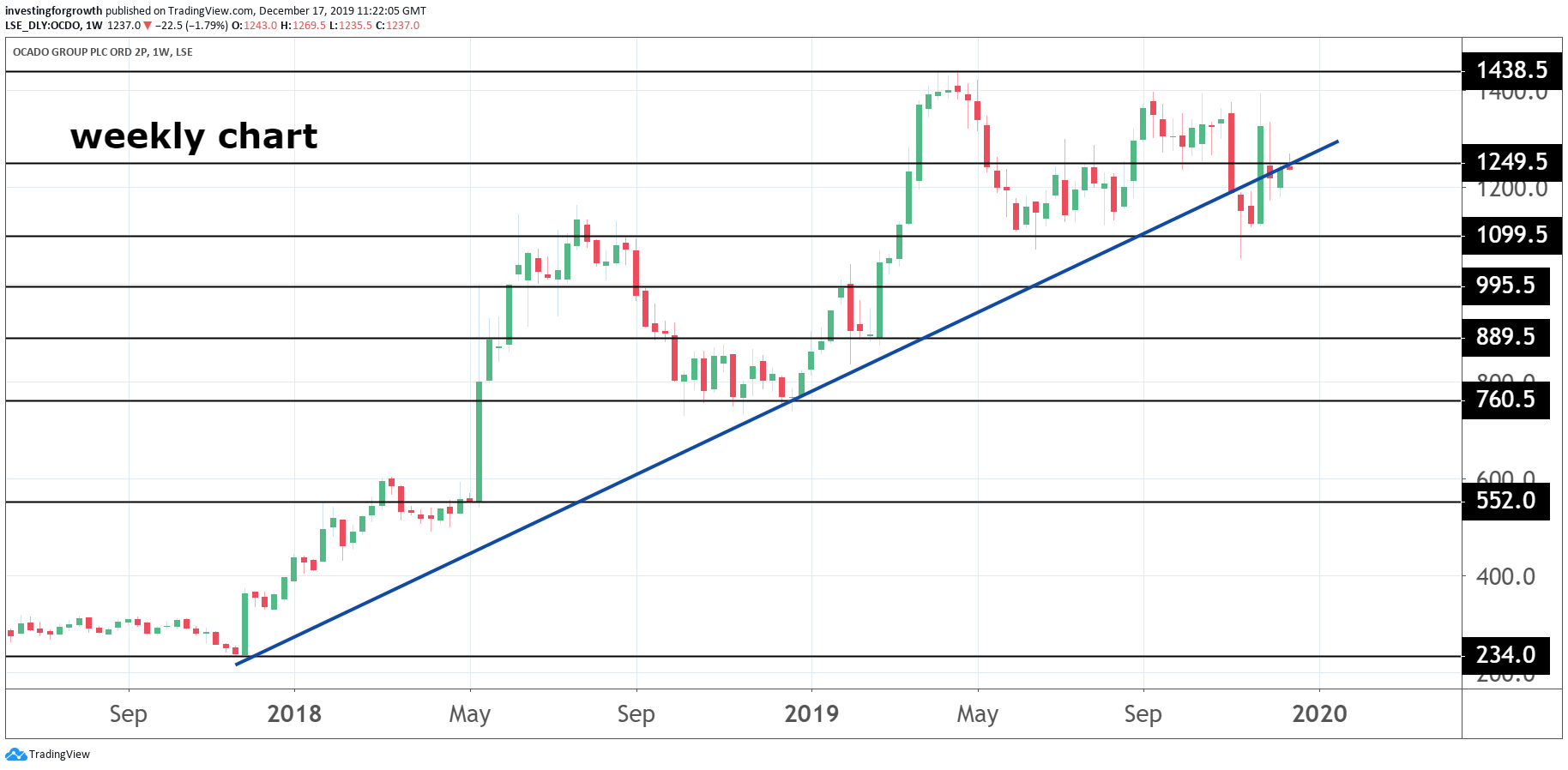Stockwatch: Deciding what to do with Ocado shares?
We discuss whether this FTSE 100 star will rally again, or if profit-takers are about to strike.
17th December 2019 09:50
by Edmond Jackson from interactive investor
Our companies analyst discusses whether this FTSE 100 star will rally again, or if profit-takers are about to strike.

Is it worth keeping the FTSE 100-listed shares in £8.7 billion online grocery retail, technology and logistics group Ocado (LSE:OCDO), as the consensus of analysts drifts to “sell”?
I initially drew attention as a long-term “buy” at 525p in January 2018 along a rationale of technology deals emerging with major food retailers internationally.
By April 2019, Ocado had breached 1,400p. Whether that was too fast too soon, the stock then traded volatile-sideways with support around 1,125p, currently 1,260p.

Source: TradingView Past performance is not a guide to future performance
The latest rise is less a 'Boris bounce' than end-November news of a major new partnership with a Japanese retailer, and a reasonably reassuring 12 December update citing over 10% growth in retail revenue for a joint venture with Marks & Spencer (LSE:MKS) (which is crucial for substituting Waitrose next year).
Yet, Ocado (LSE:OCDO) remains a long way from being cash generative, its only valuation benchmarks being 5x annual sales and 22x book value, hence its stock being driven essentially by international partnerships unfolding – where hopes of a future pot of gold lie.
The consensus of analysts appears sceptical, but so it has been during pretty much the entirety of Ocado’s astonishing gain in market value. For what it’s worth, short selling data suggests the hedge fund herd has given up, although all three disclosed traders (over 0.5%) raised their stock borrowing/selling last month. This was however after a long period of no news on international partnerships and prior to Japanese one being declared.
Steady progress with further blockbuster deals led to April’s share price high which followed 26 March news of a deal with Coles, one of Australia’s largest retailers with supermarkets, alcohol outlets and petrol stations. It didn’t quantify potential, just asserted “significant long-term value” in context of Coles’s circa £22 billion annual revenues, with losses until operations begin and cash fees kick in – possibly two years or more away.
Maybe a dearth of such news until the Japanese one broke, reflects the extent of commitment required by both sides, and if leading names are involved then plenty due diligence and the like to finalise.
- ii view: Ocado and new partner M&S deliver growing sales
- Here's why Ocado shares just made a new record high
- 10 retail stocks resisting the high street gloom
Aeon is both Japan’s and Asia’s largest grocer, in the global retailing top ten, hence potential for Ocado to engage varied retail channels from groceries to general merchandise. The joint aim is to establish a new online delivery service via the Ocado Smart Platform, as a stepping stone towards a national fulfilment network with £425 million equivalent sales by 2030.
Manifestly, it’s a long way off, while today’s share price rather discounts other such deals, potentially in the pipeline. July’s interims declared:
“We remain engaged with multiple retailers in a variety of markets with a view to adding more partnerships to our platform.”
Shareholders can take heart that such news would likely prop the share price once again.
The Aeon news timing was convenient coming just before Ocado declared a £500 million capital-raising to fund roll-out of robot-operated warehouses “and general corporate purposes” via a convertible bond issue yielding 0.75% to 1.25% a year.
It took the total number of international partnerships to seven, which could be said quite enough logistically for now - where these involve leading retailers, and to ensure capable service delivery. Interim results cited first customer fulfilment centres coming operational for partners in France, Canada, the US and Sweden.
Meanwhile, the UK service is a respected operation.
| Ocado Group - financial summary | ||||||
|---|---|---|---|---|---|---|
| year ended 2 Dec | 2013 | 2014 | 2015 | 2016 | 2017 | 2018 |
| Turnover (£ million) | 792 | 949 | 1,108 | 1,271 | 1,455 | 1,599 |
| Operating margin (%) | -0.7 | 1.7 | 1.9 | 1.7 | 0.4 | -2.0 |
| Operating profit (£m) | -5.5 | 16.3 | 21.4 | 21.6 | 5.4 | -31.9 |
| Net profit (£m) | -12.5 | 7.3 | 11.8 | 12.0 | -8.3 | -44.9 |
| Reported EPS (p) | -2.2 | 1.2 | 1.9 | 2.0 | -1.4 | -6.9 |
| Normalised EPS (p) | -0.6 | 1.5 | 2.2 | 2.5 | -1.2 | -6.7 |
| Operating cashflow/share (p) | 10.4 | 12.1 | 13.4 | 15.8 | 19.7 | 19.6 |
| Capex/share (p) | 13.2 | 12.8 | 16.0 | 20.2 | 30.2 | 26.0 |
| Free cashflow/share (p) | -2.8 | -0.7 | -2.6 | -4.4 | -10.4 | -6.4 |
| Net debt (£m) | 50.9 | 99.4 | 132 | 165 | 231 | -47.7 |
| Net assets per share (p) | 34.7 | 37.2 | 41.0 | 41.7 | 41.4 | 80.4 |
| Net tangible assets per share (p) | 28.4 | 29.0 | 30.2 | 29.0 | 39.3 | 59.2 |
| Source: historic Company REFS & published accounts |
Ocado has won The Grocer’s award for “Online Supermarket of the Year” according to the broadest range of produce, order accuracy and delivery punctuality. Attention is currently on whether a success can be made of substituting M&S food for Waitrose, and whether long-time customers might turn their noses up. A latest range review proclaims M&S has substitutes at the same price or lower, at the same quality or better, for most of those currently supplied by Waitrose. “We also anticipate adding many more M&S lines," it said. Time will tell whether Waitrose die-hards are wowed.
Otherwise, you have to go back to May for specific news on the Morrisons (LSE:MRW) partnership - seemingly disrupted by a fire at a fulfilment centre in February - though it came across as ambivalent regarding the revenue upshot.
Morrisons is “taking a holiday” on this facility, although it’s not hugely reassuring from the narrative - at interims, the relationship can lead to new elements of growth, whereas it had appeared responsible for a period of group profitability from 2014.
The interim statement cited investments through Ocado’s ventures arm “to leverage our technology expertise” e.g. in automated meal preparation and “vertical farming” (the growing of crops in stacked layers), although it is tricky to envisage their financial upshot.
Revenue growth yet to affirm “growth stock”
Consensus forecasts anticipate about 11% revenue growth in the latest year to 2 December, 13% in 2019/20, and 13.5% in 2020/21. That's respectable, although annual losses are expected only to ease from £141 million to £54 million.
Interims to 2 June showed 9.7% retail revenue growth and 20.6% growth for solutions, albeit which were a modest 8.0% of the total. So, concluding with a “hold” stance at 1,150p, I stressed this involved a long-term view – like 10 years – meanwhile, investors alert to capital preservation should probably best avoid.
Being completely honest, I’m naturally averse to Ocado’s hugely speculative market value (with some capitalising of costs that mitigate losses), yet feel I should respect its potential to emerge as a global technology leader in retail, as its 2019 deals affirm.
I followed, but missed out on, Amazon (NASDAQ:AMZN) because I remained cautious as to its market value racking up while operating losses did too. Eventually, Amazon reached an inflection point though, for impressive profits.
This experience also sharpened me to spot and draw attention to Microsoft (NASDAQ:MSFT) all-important strategic shift in 2014, when a new CEO declared its future emphatically in “cloud” operations, which has parallels with Ocado’s own speciality. Risk/reward was, however, far more supportive at Microsoft: investment value as a long-established cash generator from Windows and Office software.
Potential dilution tips me to suggest locking in gains
Despite what appears an overblown valuation, Ocado will likely agree more international partnerships in 2020, and, if the backdrop for equities is positive (US/China trade accord, corporate profitability sustained), then sentiment towards Ocado should broadly be sustained; clearly the stock has its fan club.
It would still seem wise risk management to at least consider locking in some gains, amid uncertainty as to when Ocado turns a corner for cash generation, and with dilution baked in from the convertible bond issue. Take profits.
Edmond Jackson is a freelance contributor and not a direct employee of interactive investor.
These articles are provided for information purposes only. Occasionally, an opinion about whether to buy or sell a specific investment may be provided by third parties. The content is not intended to be a personal recommendation to buy or sell any financial instrument or product, or to adopt any investment strategy as it is not provided based on an assessment of your investing knowledge and experience, your financial situation or your investment objectives. The value of your investments, and the income derived from them, may go down as well as up. You may not get back all the money that you invest. The investments referred to in this article may not be suitable for all investors, and if in doubt, an investor should seek advice from a qualified investment adviser.
Full performance can be found on the company or index summary page on the interactive investor website. Simply click on the company's or index name highlighted in the article.
Disclosure
We use a combination of fundamental and technical analysis in forming our view as to the valuation and prospects of an investment. Where relevant we have set out those particular matters we think are important in the above article, but further detail can be found here.
Please note that our article on this investment should not be considered to be a regular publication.
Details of all recommendations issued by ii during the previous 12-month period can be found here.
ii adheres to a strict code of conduct. Contributors may hold shares or have other interests in companies included in these portfolios, which could create a conflict of interests. Contributors intending to write about any financial instruments in which they have an interest are required to disclose such interest to ii and in the article itself. ii will at all times consider whether such interest impairs the objectivity of the recommendation.
In addition, individuals involved in the production of investment articles are subject to a personal account dealing restriction, which prevents them from placing a transaction in the specified instrument(s) for a period before and for five working days after such publication. This is to avoid personal interests conflicting with the interests of the recipients of those investment articles.